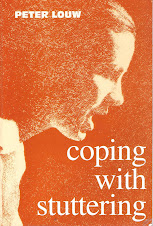 |
| Dr Martin F. Schwartz |
Those who are academically inclined may want to read a new academic article by Dr Martin F. Schwartz, "The trigger for stuttering", which will be found at http://www.stuttering.com/royal.html It's a 9-page article and it's not easy reading for non-therapists, but I mention it here because it could be one of the most important articles ever written on stuttering.
In this article, essentially the same message is presented. Dr Schwartz discusses terms such as "stuttering threshold" (the point at which stuttering will occur if the tension on the vocal cords exceeds a critical limit), "base-level tension" (the total of the various stresses such as brought on by e.g. fatigue or illness) and the "mental scanner" (which we use as a "radar" to search and anticipate risky words or situations).
The above terms are well-known for readers of Dr Schwartz, but there are also new things in this article, for instance his view of the basal ganglia in the brain as the possible source of the predisposition of the vocal cords to respond excessively to tension: "Recent research suggests that children who do not stutter are subject to the same linguistic and speech stresses as children who do, but that what separates the two groups may be a genetically-based predisposition for excessive tension to be developed at the larynx in stuttering children (Guitar 2005). Current findings implicate the basal ganglia - and its tendency to respond inappropriately when under conditions of stress - as the source of this predisposition (Alm 2004)."
Having become used to read Dr Schwartz's views in non-academic language for many years, I found it interesting and stimulating to read these same views couched in precise, academic terms. I have long suspected that Dr Schwartz has indeed pinpointed the cause of stuttering, and his arguments remain lucid, perhaps even more so now that he is addressing his peers in language to which they can relate.
'Elephants' such as stress
This article could make medical history. Sure, it doesn't solve the problem of stuttering for people who stutter, but it could be a step closer to finding academic consensus on the cause of stuttering. And once we have consensus on the cause, a real cure may be the next step. Of course, if you agree with his hypothesis it should also give you new understanding of the problem - understanding which should help in managing the defect better; and this also provides guidelines for treatment.
Dr Schwartz has in the past clashed heavily with traditionally-minded therapists, and this article will hopefully result in renewed debate. Change is inevitably accompanied by controversy and heated exchanges as outdated concepts and established interests make place for renewal. In an area where 'elephants' such as stress (not the same as anxiety) freely roam without being noticed, renewal is urgently needed.
In this article, Dr Schwartz challenges his peers to a new way of thinking about stuttering. The older generation of therapists will probably steadfastly cling to the old order of things; but it seems that some younger members of the profession are showing interest in this approach. Hopefully they will take this line of thinking further.






No comments:
Post a Comment